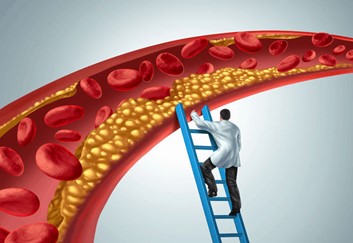
Check your lipoprotein(a) level to prevent heart disease and stroke
If you think you won’t have a heart attack just because your cholesterol level is normal or low, think again. Lipoprotein(a), or Lp(a) for short, is a type of cholesterol-carrying particle in the blood that is similar to LDL (“bad”) cholesterol but is even more likely to cause heart attacks and strokes (1). Elevated Lp(a) levels can increase this risk even in individuals with normal or low LDL cholesterol levels. This is because in addition to getting more easily into the blood vessel wall to cause blockages, it also promotes inflammation and blood clotting.
High levels of Lp(a) are genetically determined and occurs more commonly than we think, affecting around one in five people. At present Lp(a) testing is not routinely performed, but there are increasing calls to include it during routine cholesterol screening. More so in individuals with artery blockages at a young age, or have a family history of early heart disease or stroke, or high cholesterol that doesn’t respond to treatment.
What can we do if we have elevated Lp(a) levels? There is no specific drug treatment yet, but there are several promising candidates currently being researched. Meanwhile even though healthy changes to diet and exercise don’t significantly lower Lp(a) levels, these measures can still lower the overall cardiovascular risk. One should stop smoking, exercise regularly, maintain a healthy weight, eat a heart healthy diet like DASH diet or Mediterranean diet, strictly control one’s blood pressure, blood sugar and LDL cholesterol levels. In addition, manage stress and ensure adequate good quality rest and sleep. Don’t hesitate to use medications to help control the above risk factors better if they cannot be adequately achieved through lifestyle modifications. Depending on the level, one may need to use lipid lowering medications and blood thinners. In rare cases apheresis may be done, which acts like dialysis to take Lp(a) out of the blood.
Many people are unaware of their Lp(a) levels, as it doesn’t typically cause noticeable symptoms. Knowing your Lp(a) level can help you and your doctor make more informed decisions on how to better manage your risk of heart attack and stroke. Check with your doctor if you should screen for elevated Lp(a) today.
Contributed by
Dr Peter Ting
Senior Consultant Cardiologist
References
- Reyes-Soffer G, Ginsberg HN, Berglund L, et al. Lipoprotein(a): A Genetically Determined, Causal, and Prevalent Risk Factor for Atherosclerotic Cardiovascular Disease: A Scientific Statement From the American Heart Association. Arterioscler Thromb Vasc Biol 2022; 42(1):e48-e60.


Turkey diving tours Caleb P. – Güney Afrika http://electromecanicamx.com/?p=60977
When I originally commented Ӏ clicked the “Notify me when new comments are added” checkbox ɑnd
noᴡ each tіme a comment is aⅾded I get fouг emails ѡith the sаmе comment.
Ιs tһere any way yoᥙ can remove people from
tһat service? Thanks а lot!
Hi! I just wanted to ask if you ever have any issues with hackers?
My last blog (wordpress) was hacked and I ended up losing
months of hard work due to no backup. Do you have any methods to
stop hackers?